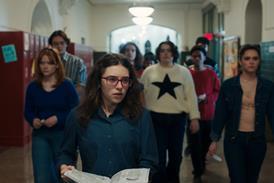EM Media chair Lisa Opie explains why Ridley Scott’s Robin Hood is putting the spotlight on the UK city of Nottingham
With Ridley Scott’s Robin Hood opening the Cannes Film Festival, some film aficionados are bound to decry an increasingly commercial festival at risk of sidelining its auteur roots. As the chair of Nottingham-based EM Media, the financier of 37 creatively-drive British feature films, we are delighted to have the spotlight shining on the region as we strive to ensure of local stories reach global audiences.
But it is not just Robin Hood that Nottingham should be celebrating. The city has a history of quality auteur film-making – thanks in no small part to its film-making hero Shane Meadows. In addition, a culture of support and collaboration in the city and the wider region, coupled with public and private intervention, has seen a wave of talent successfully marrying the creative with the commercial, maximising the opportunities generated by a digital reality.
Flagship digital cinemas are working with rural promoters and non-traditional venues across the region, to offer audiences access to world cinema no matter where they live. Local venues such as Broadway in Nottingham are exploring partnerships with local producers to develop innovative audience-driven content; a mutually beneficial partnership providing opportunities to develop new talent, new forms of creative production and explore the potential for new revenue streams. These are key developments that feed in well to national trends for niche product development. Soda’s new British Cinema Quarterly initiative; the Take 12 programme designed to digitally future-proof film businesses and the ScreenLit festival highlighting the crossover between TV dramas and feature films all highlight talent wanting to think positively and differently about their businesses.
This is seen in projects such as Soda’s new British Cinema Quarterly, a scheme that will see distinctive UK films toured around the country, the Take 12 programme, which has been designed to help film businesses develop into digital, and the ScreenLit Festival, which aims to promote the crossover between TV dramas and films. All of these schemes aim to highlight talented people and companies that want to think positively and differently about their work.
As the global industry works to catch up with the realities of the digital world, the UK debate is still centred on a perception of limited opportunity; of inability to compete with American studio product and of delivering home grown blockbusters. In fact, there is no lack of UK talent engaging with the digital world as it is; those of us working in the English regions know only too well how much talent there is out there. However, the is a lack of understanding that getting to the right market is key and that learning how to do so is an art and a science.
In spite of the video games industry’s contribution of $1.5bn (£1bn) a year to the UK economy, evidence that it is falling behind its global competitors has prompted the promise of a tax relief scheme. How games change in response to a British cultural test will be fascinating; will we perhaps be seeing a rise in auteur driven games product?
This is an immense opportunity, on a small scale, to achieve what the studios have so far found elusive – matching creative excellence with current and diverse tastes. In order to get this right, we need to be sure that the UK has the best talent management system possible. ? Of our marketers, designers and agencies, who are still amongst the best in the world? How are UK publishers engaging with UK directors and producers beyond Soho’s Golden Square? Where are the TV execs sourcing their next watercooler drama from? And what are the publicly supported agencies doing to facilitate a better talent flow across the piece?
One thing is for sure, as chair of EM Media, one of the agencies charged with developing local creative industries in a digital marketplace, I am confident that there is a support network in place to build on the success of local heroes like Shane and to make the connections required - across disciplines, across media and territories, to deliver the commercial success that our creatives richly deserve.
Lisa Opie is currently media consultant for Two Four (Broadcast’s Independent of the Year), formerly Managing Director of Content at FIVE and Managing Director for Flextech Television (now Virgin TV). Currently Chair of the Board of Regional Screen Agency EM Media.























No comments yet